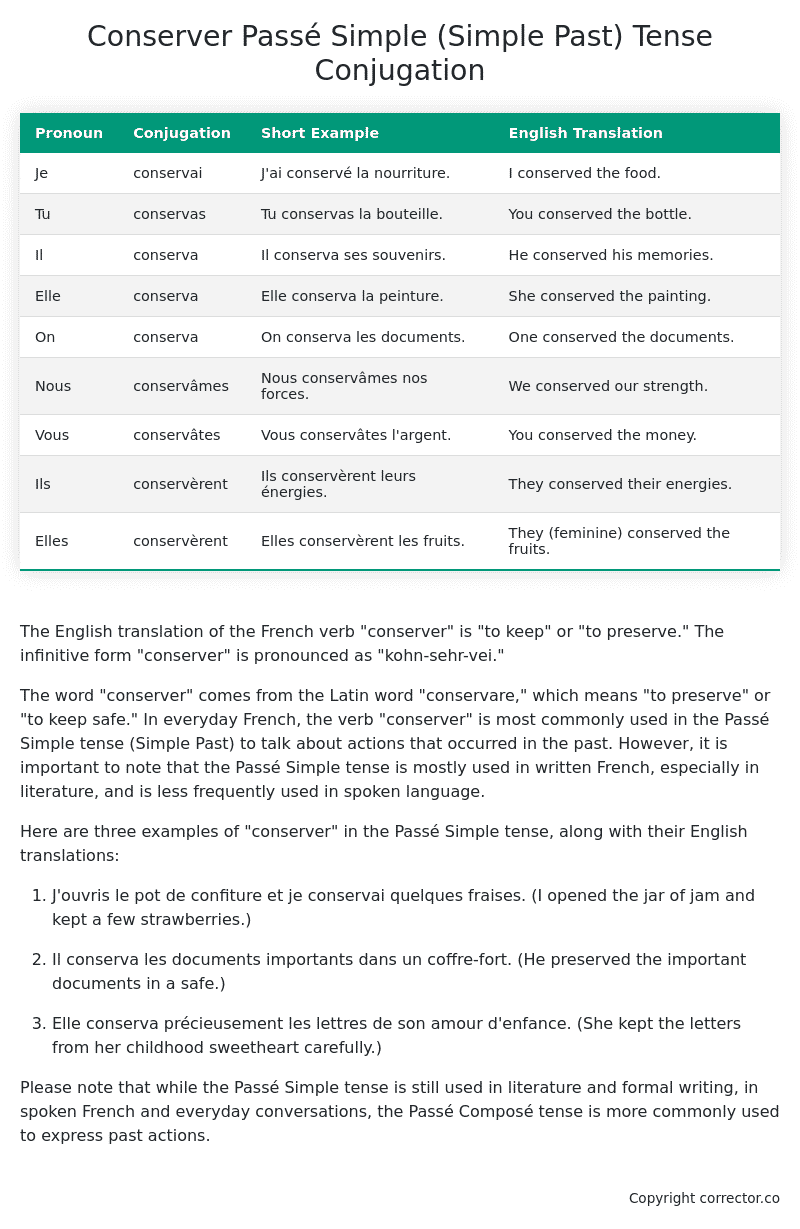Passé Simple (Simple Past) Tense Conjugation of the French Verb conserver
Introduction to the verb conserver
The English translation of the French verb “conserver” is “to keep” or “to preserve.” The infinitive form “conserver” is pronounced as “kohn-sehr-vei.”
The word “conserver” comes from the Latin word “conservare,” which means “to preserve” or “to keep safe.” In everyday French, the verb “conserver” is most commonly used in the Passé Simple tense (Simple Past) to talk about actions that occurred in the past. However, it is important to note that the Passé Simple tense is mostly used in written French, especially in literature, and is less frequently used in spoken language.
Here are three examples of “conserver” in the Passé Simple tense, along with their English translations:
-
J’ouvris le pot de confiture et je conservai quelques fraises.
(I opened the jar of jam and kept a few strawberries.) -
Il conserva les documents importants dans un coffre-fort.
(He preserved the important documents in a safe.) -
Elle conserva précieusement les lettres de son amour d’enfance.
(She kept the letters from her childhood sweetheart carefully.)
Please note that while the Passé Simple tense is still used in literature and formal writing, in spoken French and everyday conversations, the Passé Composé tense is more commonly used to express past actions.
Table of the Passé Simple (Simple Past) Tense Conjugation of conserver
| Pronoun | Conjugation | Short Example | English Translation |
|---|---|---|---|
| Je | conservai | J’ai conservé la nourriture. | I conserved the food. |
| Tu | conservas | Tu conservas la bouteille. | You conserved the bottle. |
| Il | conserva | Il conserva ses souvenirs. | He conserved his memories. |
| Elle | conserva | Elle conserva la peinture. | She conserved the painting. |
| On | conserva | On conserva les documents. | One conserved the documents. |
| Nous | conservâmes | Nous conservâmes nos forces. | We conserved our strength. |
| Vous | conservâtes | Vous conservâtes l’argent. | You conserved the money. |
| Ils | conservèrent | Ils conservèrent leurs énergies. | They conserved their energies. |
| Elles | conservèrent | Elles conservèrent les fruits. | They (feminine) conserved the fruits. |
Other Conjugations for Conserver.
Le Present (Present Tense) Conjugation of the French Verb conserver
Imparfait (Imperfect) Tense Conjugation of the French Verb conserver
Passé Simple (Simple Past) Tense Conjugation of the French Verb conserver (You’re reading it right now!)
Passé Composé (Present Perfect) Tense Conjugation of the French Verb conserver
Futur Simple (Simple Future) Tense Conjugation of the French Verb conserver
Futur Proche (Near Future) Tense Conjugation of the French Verb conserver
Plus-que-parfait (Pluperfect) Tense Conjugation of the French Verb conserver
Passé Antérieur (Past Anterior) Tense Conjugation of the French Verb conserver
Futur Antérieur (Future Anterior) Tense Conjugation of the French Verb conserver
Subjonctif Présent (Subjunctive Present) Tense Conjugation of the French Verb conserver
Subjonctif Passé (Subjunctive Past) Tense Conjugation of the French Verb conserver
Subjonctif Imparfait (Subjunctive Imperfect) Tense Conjugation of the French Verb conserver
Subjonctif Plus-que-parfait (Subjunctive Pluperfect) Tense Conjugation of the French Verb conserver
Conditionnel Présent (Conditional Present) Tense Conjugation of the French Verb conserver
Conditionnel Passé (Conditional Past) Tense Conjugation of the French Verb conserver
Conditionnel Passé II (Conditional Past II) Tense Conjugation of the French Verb conserver
L’impératif Présent (Imperative Present) Tense Conjugation of the French Verb conserver
L’impératif Passé (Imperative Past) Tense Conjugation of the French Verb conserver
L’infinitif Présent (Infinitive Present) Tense Conjugation of the French Verb conserver
L’infinitif Passé (Infinitive Past) Tense Conjugation of the French Verb conserver
Le Participe Présent (Present Participle) Tense Conjugation of the French Verb conserver
Le Participe Passé (Past Participle) Tense Conjugation of the French Verb conserver
Struggling with French verbs or the language in general? Why not use our free French Grammar Checker – no registration required!
Get a FREE Download Study Sheet of this Conjugation 🔥
Simply right click the image below, click “save image” and get your free reference for the conserver Passé Simple tense conjugation!

Conserver – About the French Passé Simple (Simple Past) Tense
Formation
Usage
Narration
Historical Context
Interactions with other tenses
Passé Composé
Imparfait
Conditional and Subjunctive
Summary
I hope you enjoyed this article on the verb conserver. Still in a learning mood? Check out another TOTALLY random French verb conjugation!


